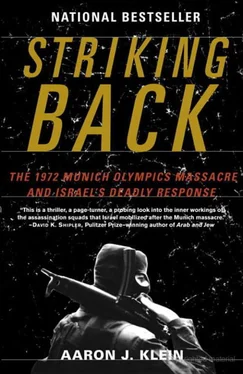What Lalkin didn’t know was that the Israeli defense establishment was doing nothing to protect the country’s Olympians. Everything concerning the protection of the Olympic delegation (and other Israeli national groups) was falling through the cracks. No senior official felt any need to address the issue. Israel, at the time, was under mounting stress: planes were hijacked, Israeli officials targeted. The attacks were coming in quick succession, but the Shabak, the organization charged with homeland security, failed to connect any of the dots. Their failure went far beyond ignoring the security flaws in the Olympic Village. The deeper, more basic failure was rooted in a lack of interest, a downright disregard for a rapidly escalating situation. Only bloodshed would facilitate real change.
While Lalkin worried, at Mossad headquarters, in the Hadar Dafna building at 39–41 King Saul Boulevard in north Tel Aviv, no one was losing any sleep. Work flowed in and out of the cold concrete building as usual. Even three hundred yards away at the IDF’s headquarters, on the south side of King Saul Boulevard, where Branch 4’s crude wooden cabins were located, there was no new activity. Branch 4 of Military Intelligence, charged with collecting, analyzing, and assessing data on Palestinian terror organizations, did not earmark a single piece of data relating to the possibility of an Olympic attack. The Kopel Report examined the intelligence agencies’ conduct in the prelude to the Olympics and revealed, “The Defense Establishment continually received information on the express desire to commit an attack in Europe. The flow of information was thin in comparison with other times during the year, but in August 1972 there was a rise in the number of reports regarding a planned attack in Europe. None mentioned the Olympics by name.” One report from that time did mention an “international event,” which might have hinted at the terrorist leaders’ intentions to carry out a high-profile attack, but it received no special attention.
Even on Thursday, August 31, the sixth day of the Games, when the heads of Military Intelligence, the Shabak, and the Mossad met for their weekly conference, no bells were sounded. The committee analyzed the week’s intelligence reports, but failed to associate anything with the ongoing Games. Intelligence officers who later went over the information that existed at the time had this to say: “Do you have any idea how many bits of intelligence we get that relate to future ‘international events’ and then result in nothing? On the basis of that type of intelligence you cannot issue an official warning.”
4
THE GAMES OF PEACE AND JOY
MUNICH
SATURDAY, AUGUST 26, 1972, 1500H
The opening ceremony of the 20th Olympic Games was dazzling. A record 121 delegations and over seven thousand athletes entered the stadium in dress uniforms, took their places on the well-groomed grass, and watched as whip-wielding Bavarian dancers twirled and stomped. Thousands of doves fluttered skyward. An eighteen-year-old German athlete, Günter Zahn, ran into the stadium, bounded up the steps, and lit the Olympic torch. The Games were under way.
The positive feeling in the stadium was carefully constructed to erase the scars of Germany’s bloody past. Local organizers did everything they could to convey the message that Germany’s rehabilitation was complete, that 1936—when Berlin, under Adolf Hitler, hosted the 11th Olympiad against a backdrop of discrimination and violence—was a relic of a dead past. Federal officials, the local Bavarian state government, German Olympic officials, the police, the press, and ordinary citizens were all part of an effort to showcase a progressive, an enlightened, a cultured Germany.
The Israeli delegation’s participation in these Olympics was central to Germany’s theatrical act of repudiation. Israel’s twenty-seven-member squad was that country’s largest ever. Henry Hershkowitz, a marksman, carried the blue and white flag through the stadium, trembling with excitement. “I felt awesome pride that Jews could raise their flag on German soil,” he told reporters after the event. “This is proof that the Nazis weren’t able to crush the Jewish spirit, the Israeli spirit.” An especially loud roar engulfed the Israeli team as it entered the packed stadium.
Over four thousand reporters, editorialists, and radio broadcasters were in attendance to cover the games—more evidence of Germany’s desire to be seen as a new country. About two thousand television reporters and crew were by their side. These numbers far exceeded those of the 1968 Mexico City Games—indeed of any previous Olympics. The main events would draw a billion viewers in over one hundred countries.
The live broadcast was one of the great achievements of the 20th Olympic Games. In today’s world, where a cell phone can take pictures, record sound, and serve as a fully functioning computer, a live broadcast might seem trivial, but in 1972 it was a technological wonder. The Munich Olympics would dominate the international airwaves. No war or major geopolitical conflict was going on; there was nothing that could compete with the Games. The Germans planned to squeeze every possible ounce of positive publicity they could out of the seventeen-day event.
From the outset, the Germans emphasized the Olympic message of world peace. They didn’t want the world to see them holding guns, which might evoke old images. No armed guards or police were positioned in the Olympic Village or at stadium entrances. Instead, two thousand Olys, ushers in sky-blue uniforms, were given the twin duties of perimeter security and traffic control. Only those with a pass could enter the fenced village. But as the Games progressed, the ushers’ diligence waned. The perimeter fence added little additional security: many of the Olympians hopped it with ease, well after midnight, on their way back from Munich’s beer halls.
Security costs for the Games came to $2 million. The relatively insignificant sum was not born of miserliness, but of a frank desire to keep security to a minimum. For subsequent Olympics, security costs rose exponentially, peaking in 2004 at $1 billion. The German security concept, one that held that guards, both visible and undercover, could only tarnish the Games and blacken the image of the new Germany they were trying to convey, unknowingly facilitated Black September’s plans. German authorities were well equipped to deal with unruly men and copious quantities of beer, but were utterly unprepared for a terrorist attack.
• • •
The Israeli delegation set out for Munich on the 21st of August. No security detail, covert or otherwise, accompanied them. Several days before their departure the delegation had been invited to the Wingate Institute, Israel’s National Center for Physical Education and Sports, for a standard briefing. Arie Shumar, the Education, Culture and Sports Ministry’s chief security officer, gave the address, which seemed brief and banal to the Israelis. They had heard the same advice each time they left the country to represent Israel. Don’t draw attention to yourselves. No loud conversations in Hebrew, no clothing with obvious Hebrew symbols. Beware of suspicious packages in your dorms. Avoid opening any type of mail, even if it comes from home.
There was no mention of a possible mega-attack in the briefing. Complacency? The mere appearance of control and order? Yes, that was how things were on the Israeli side.
Most of the Israeli delegation was housed at 31 Connollystrasse, along with the Uruguayan and Hong Kong teams. Security conditions in the dorms left the athletes ill at ease. The top secret Kopel Report states on page nine, “The testimony of athletes, delegation leaders, journalists and television crews makes clear that members of the delegation, other officials, and family members frequently talked among themselves about the obvious lack of security in the village, particularly regarding their housing. The uncomfortable feeling intensified as the alacrity of the security ushers abated. The proximity of the Sudanese team’s dorms and the ubiquity of Palestinian workers in the village intensified the general discomfort. Many of the athletes feared they would be attacked during their events. No one considered the possibility of a hostage situation. The fears festering in the minds of the athletes didn’t result in a call to bolster security. They didn’t act, they said, because they assumed that the security forces must be working undercover.” These words do not begin to convey the scandalous enormity of the German, and Israeli, security lapses in Munich.
Читать дальше












